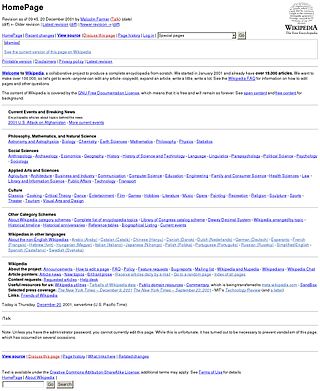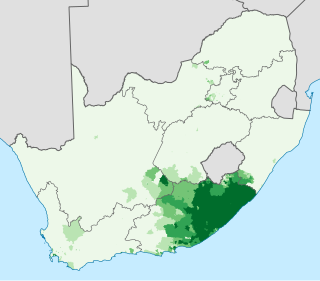
The Bantu languages are a language family of about 600 languages that are spoken by the Bantu peoples of Central, Southern, Eastern and Southeast Africa. They form the largest branch of the Southern Bantoid languages.

Wikipedia, a free-content online encyclopedia written and maintained by a community of volunteers known as Wikipedians, began with its first edit on 15 January 2001, two days after the domain was registered. It grew out of Nupedia, a more structured free encyclopedia, as a way to allow easier and faster drafting of articles and translations.

Zulu, or isiZulu as an endonym, is a Southern Bantu language of the Nguni branch spoken and indigenous to Southern Africa. It is the language of the Zulu people, with about 13.56 million native speakers, who primarily inhabit the province of KwaZulu-Natal in South Africa. The word "KwaZulu-Natal" translates into English as "Home of the Zulu Nation is Natal". Zulu is the most widely spoken home language in South Africa, and it is understood by over 50% of its population. It became one of South Africa's 12 official languages in 1994.

Xhosa, formerly spelled Xosa and also known by its local name isiXhosa, is a Nguni language, indigenous to Southern Africa and one of the official languages of South Africa and Zimbabwe. Xhosa is spoken as a first language by approximately 8 million people and as a second language in South Africa, particularly in Eastern Cape, Western Cape, Northern Cape and Gauteng, and also in parts of Zimbabwe and Lesotho. It has perhaps the heaviest functional load of click consonants in a Bantu language, with one count finding that 10% of basic vocabulary items contained a click.

isiNdebele, also known as Southern Ndebele is an African language belonging to the Mbo group of Bantu languages, spoken by the Ndebele people of South Africa.

The English Wikipedia is the primary English-language edition of Wikipedia, an online encyclopedia. It was created by Jimmy Wales and Larry Sanger on 15 January 2001, as Wikipedia's first edition.

Swazi or siSwati is a Bantu language of the Nguni group spoken in Eswatini and South Africa by the Swati people. The number of speakers is estimated to be in the region of 4.7 million including first and second language speakers. The language is taught in Eswatini and some South African schools in Mpumalanga, particularly former KaNgwane areas. Siswati is an official language of Eswatini, and is also one of the twelve official languages of South Africa.
The Nguni languages are a group of Bantu languages spoken in southern Africa by the Nguni people. Nguni languages include Xhosa, Zulu, Ndebele, and Swati. The appellation "Nguni" derives from the Nguni cattle type. Ngoni is an older, or a shifted, variant.

The Portuguese Wikipedia is the Portuguese-language edition of Wikipedia, the free encyclopedia. It was started on 11 May 2001.

The Italian Wikipedia is the Italian-language edition of Wikipedia. This edition was created on 10 May 2001, and first edited on 11 June 2001. As of 18 December 2024, it has 1,895,981 articles and more than 2,582,728 registered accounts. It is the 9th-largest Wikipedia by the number of articles.

An assegai or assagai is a polearm used for throwing, usually a light spear or javelin made up of a wooden handle with an iron tip.

The Nguni people are a linguistic cultural group of Bantu cattle herders who migrated from central Africa into Southern Africa, made up of ethnic groups formed from iron age and proto-agrarians, with offshoots in neighboring colonially-created countries in Southern Africa. Swazi people live in both South Africa and Eswatini, while Ndebele people live in both South Africa and Zimbabwe.

The Kazakh Wikipedia is the Kazakh language edition of the free online encyclopedia Wikipedia, founded on 3 June 2002.

The Egyptian Arabic Wikipedia is the Egyptian Arabic version of Wikipedia, a free, open-content encyclopedia. This Wikipedia primarily acts as an alternative to the Arabic Wikipedia in favor of speakers of the Egyptian dialect. Until 2020, it was the only Wikipedia written in a localised dialect of Arabic. The second one is Moroccan Wikipedia, which was approved and created in July 2020.

The following outline is provided as an overview of and topical guide to South Africa:

The Xhosa people, or Xhosa-speaking people are a Bantu ethnic group native to South Africa. They are the second largest ethnic group in South Africa and are native speakers of the isiXhosa language.

The Alemannic Wikipedia is the Alemannic language edition of the Web-based free-content encyclopedia Wikipedia. The project was started on 13 November 2003, as an Alsatian language edition. A year later it was expanded to encompass all Alemannic dialects because of low activity in the first year. Since 2004 all Alemannic dialects are accepted on als:wp.

Sinenjongo High School is a high school in Joe Slovo Park, Milnerton, Cape Town, South Africa.

The Volapük Wikipedia is the Volapük-language edition of the free online encyclopedia Wikipedia. It was created in February 2003, but launched in January 2004. As of 18 December 2024, it is the 109th-largest Wikipedia as measured by the number of articles, with about 39,000 articles, and the third-largest Wikipedia in a constructed language after the Esperanto Wikipedia and the Ido Wikipedia.


















